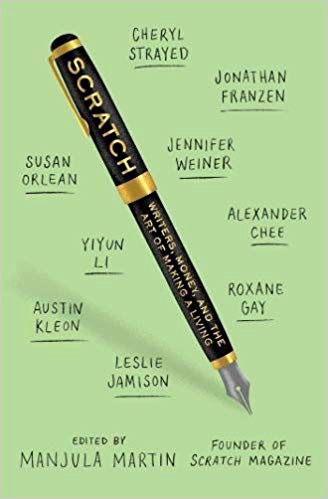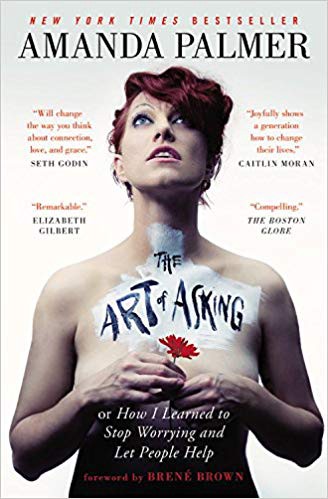Three things that might help.
 Photo by Radu Florin on Unsplash
Photo by Radu Florin on Unsplash
Dear Shaunta,
I?m not sure if I want to do this for free. Can I make a living as a fiction writer?
From, an anxious Ninja Writer
Hey, Ninja Writer!
I totally understand your anxiety. Thinking about your prospects of earning a living as a fiction writer can be daunting. Because the bald truth is, very few writers actually get there.
This isn?t the kind of profession where if you go to school and study real hard, you?re pretty much guaranteed a middle-income job at the end.
Writing can feel more like a skill-based lottery. If you work real hard and have some base talent, maybe you?ll catch lightning in a bottle and be one of the very few writers who earns eye-popping advances.
But, of course, there are many writers who earn some money, even if it isn?t an eyeball threatening amount. Mid-list writers, indie writers who gain some traction ? they all earn some money.
And included in that pool of all writers are people who wrote one book and stopped. Or who write a lot, but not at a professional level. Or who write, but rarely finish any projects. You can put yourself at the top of the heap just by being a writer who writes a lot, tries to publish often, and consistently improves.
The truth is, though, that there is a good chance that you won?t ever be able to quit your day job and just write full time for the rest of your life. It might happen, but it is more likely that someday you?ll sell a book, maybe you?ll get an advance big enough to be a full time writer for a while, and if you do that, maybe you?ll sell another one or maybe you?ll have to go back to a day job for a while. And so on. And so on.
Here?s how that?s gone for me.
I sold two books in 2012. One was published in 2013 and one in 2014. I earned an advance of $7500 for each of those. Obviously, $15,000 for two years work is not enough to live on.
I sold another two books in 2017 for books that will be published in 2019 and 2020. My advance for those books was considerably larger. Enough to give me two modest years of full time writing. Those two years are up right around the time the first of these books is published. If I am offered another contract or write another book that my agent can sell, maybe I?ll earn enough for another year or two.
Fiction writing is not a salaried position. It?s definitely not an hourly job. It?s work that often pays in fits and starts ? a bunch of money now, no money at all for a long time. It?s also fickle and depends on a market and on the subjective tastes of other people.
Here are my best tips for navigating the whole ?working writer? thing.
Embrace your day job
Being a writer is a unique job that benefits from lived experience. Get out there and find unique and interesting day jobs. I?ve worked as a drug court counselor, a paralegal, a bankruptcy and divorce preparer, a vintage clothing seller, a teacher?s assistant, a substitute teacher, a small-town newspaper reporter.
All of that work has given me experience that feeds my writing.
The best piece of advice I can give you is to train your brain to think about whatever your day job is as being in service to your writing career. Waiting tables or teaching or working in an office ? whatever it is you do to fill your bank account ? puts a roof over your head, under which you get to write.
Plus, every person you meet, every skill you learn, every experience you have ? it all filters back into your writing machine.
Learn to love the income stream
This Humans of New York post came across my Facebook feed the other day and it struck a chord.
Humans of New York
“I’m a singer and songwriter. And a bartender. And a babysitter. On weekends I host dinner parties for $65 a plate. And?
www.facebook.com
Writers are self-employed. When you?re self-employed, income streams are key. The woman above sells things, teaches things, cooks things, babysits . . . and all of it supports her creative work (for her, that?s singing and songwriting, but it applies to fiction writers.)
Figure out a few ways you can bring in some money, if you?re determined not to have a standard 9 to 5. If you?re a writer, that can mean using your skill to write non-fiction. Start here on Medium.
Be productive
Sometimes, I feel like a broken record, but I?m going to say it again. The thing that sets any writer who is earning an income apart from all the other writers is work.
The one thing I think every working writer who earns any kind of living has in common is work ethic. Indie writers who earn enough money to live on are often finishing a book every month or two. Seriously. And if you want to get traditionally published, you?ll have to wrap your head around the idea that you may need to write half a dozen books or more before you get to that level.
It?s pretty common for writers to be fickle about their work. There?s even a term for when a writer just can?t work at all: Writer?s Block. The best things that being a newspaper reporter taught me was to write anyway, blocked or otherwise. I was on a constant deadline and there was no time for that nonsense.
If you?re serious about being a working fiction writer, then you have to be willing to work (a lot) before the money happens. How much do you write a day? I advocate for a daily writing habit that starts with a teeny tiny goal ? just ten minutes a day. My experience is that A) that ten minutes usually turns into twice that amount of time or more and B) most writers do not write even that much.
If you?re one of the writers who develops a daily writing habit and sticks to it, you?re so far ahead of the game. Think of it this way. If you?re concerned about making a living as writer, then you have to think of writing as your job. Show up to work everyday and see what happens.
The tl;dr answer is this: you can earn an income as a writer, but you have to be willing to front load your career with a lot of work for which you?re mostly paid by an improvement in your skill. So, be okay with doing other work and teach yourself to see that work as an extension of your writing.
Love,Shaunta
P.S. One of the best books I?ve read on the subject of writing and earning an income is Scratch: Writers, Money, and the Art of Making a Living by Manjula Martin.

I also highly reccomend The Art of Asking by Amanda Palmer.

Here?s my secret weapon for sticking with whatever your thing is.
Shaunta Grimes is a writer and teacher. She is an out-of-place Nevadan living in Northwestern PA with her husband, three superstar kids, two dementia patients, a good friend, Alfred the cat, and a yellow rescue dog named Maybelline Scout. She?s on Twitter @shauntagrimes and is the author of Viral Nation and Rebel Nation and the upcoming novel The Astonishing Maybe. She is the original Ninja Writer.


